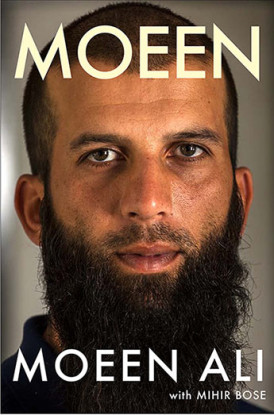Moeen
Martin Chandler |Published: 2018
Pages: 298
Author: Ali, Moeen
Publisher: Allen and Unwin
Rating: 4 stars

Mid career autobiographies are not generally my favourite type of cricket book, which is part of the reason it has taken until now for me to pick up and read Moeen Ali’s autobiography. The delay meant that I have had the opportunity to consider the reviews of others. The unstintingly positive content of those reviews were the prompt I needed to finally allow Moeen to reach the top of my ‘pending’ pile.
One of the most striking things about Moeen is that he has, ever since he first broke into the senior England side, been one of the most popular members of it. His smile, boyish charm and good nature have, together with his obviously considerable cricketing talent, combined to make him a great favourite with England supporters. Such popularity helps with sales, but to be a decent read an autobiography generally needs an injection of controversy. Initially I didn’t expect that to be the case with Moeen, and that was undoubtedly part of the reason why I wasn’t too quickly out of the blocks when the book was published last year.
The message from the reviews was consistent however, and it seemed clear there was more to Moeen than met the eye and, having now read the book, I can certainly confirm that is the case.
Any autobiographical offering from a current player has contractual constraints for the aspiring writer and his ghost, in this case the well known journalist Mihir Bose. In addition to the ‘legals’ there is also the ‘team spirit factor’, and between them those considerations almost guarantee that the story of a man’s international career appears in a somewhat sanitized version. John Arlott used to describe such books as ‘cricket shop’, and if you want an entertaining fly on the wall look at those parts of the life of an international cricketer that he feels able to share with you then Moeen is an excellent example.
Bose ensures Moeen’s reader gets a well crafted account of an England career that has had plenty of highs to go with the occasional low. What you don’t get however is, for example, any real insights as to how the Ashes failure of 2017/18 affected anyone other than Moeen or, beyond his own form issues, the reasons for England’s sorry performance.
But the plaudits earned by Moeen are not for the way it deals with the success that has deservedly come Moeen’s way, but for the account of how he got there, and almost half of the book is spent dealing with his upbringing. Inevitably in that context the reader learns much of the lives of Moeen’s father, Munir, his older brother Kadeer (Worcestershire, Gloucestershire and England A), cousin Kabir (Worcestershire, Hampshire, Lancashire and England) and younger brother Omar, clearly a fine cricketer and, perhaps, a little unfortunate not to have joined his brothers in the professional ranks.
Hailing from the Sparkbrook area of Birmingham Moeen’s childhood was certainly not an easy one, and as he explains he had many issues to contend with. His dedication and single-mindedness are to be applauded, particularly in the circumstances that he grew up in, but in a lot of ways the hero of the story is Munir. Would I have made the sacrifices he did if I had seen the talent in my sons that he saw in his? I would like to be able to answer that in the affirmative, but would be kidding myself if I did. He is a remarkable man.
There is much in Moeen’s story that will cause his reader to stop and think. The insights into Moeen’s views on Islam are particularly illuminating, and his chance meeting with the man who was the catalyst for his having the attitude he now has towards the religion that is so important to him is a particularly enlightening part of the story. A word at that point should also be given to Bose, who weaves a skilful explanation of some basic tenets of Islam a number of which this reviewer then realised he had not previously understood at all.
There is also much input from Munir throughout Moeen, but if I had to venture one slight expression of disappointment it would be in relation to the lack of any contribution from one or two others with significant roles. One of the negatives in Moeen’s life were the circumstances that gave rise to his leaving Warwickshire. It would be interesting to know the views on that subject of Mark Greatbatch, who appears to have been the villain in that episode, and of Dennis Amiss who, it would seem, was the man who unsuccessfully attempted to pour oil on the troubled waters.
In conclusion I can only agree with those who got there before me and confirm that Moeen is a book that I would unhesitatingly recommend. It gets a commendable four stars, which is based on five for the first half, and three for the second and, for once, no gripe about the lack of a statistical appendix or an index. That concession made I would still have preferred it if both had been present.






Pushing this book a few slots higher in the ‘pending pile’ 🙂
Comment by vincentsunder | 3:09am BST 8 June 2019